Armed with a quad bike, chopped vegetables and some giant pollen grains, Reading academics took sensory-themed research to the public at the Berkshire Show on 21 – 22 September. Here are some pictures of what they got up to.

Persuading children to eat vegetables and try new foods is something many parents struggle with. Dr Natalie Masento, whose research spans Food and Nutrition Sciences and Psychology runs the EIT Food-funded See and Eat project. This aims to help parents to get their children familiar with the look and feel of vegetables to help them overcome their inbuilt fear of trying new foods and encourage them to eat more vegetables.
At the Berkshire show, Natalie showcased some of her ebooks which show the farm to fork journey of a specific vegetable, with the option to add audio, video or pictures to allow children to make their own story about it. Meanwhile in the Story Corner there were props for children to make their own food story using vegetable plants, whole pieces of vegetable and some cut up pieces.

The undisputed biggest attraction of the University of Reading tent, with a steady queue of children for most of the weekend, was the Virtual Reality Quadbike Experience (Museum of English Rural Life). Giving visitors the chance to experience being a modern day shepherd on Dartmoor, the activity drew upon Dr Kate Allen’s work with the purpleSTARS project, which aims to make museums accessible for everyone by including elements of sensory experience.

A stand named Your Sensory Experience (above) explored our individual differences in aroma and taste perception and how these influence which foods we eat and enjoy. To learn to like bitter tastes we have keep trying bitter foods – although for some people the hurdle is higher because they’re more sensitive to bitter taste. However research by Dr Stella Lignou (pictured), Dr Lisa Methven and Dr Jane Parker from the Department of Food and Nutritional Sciences has shown that regardless of your genetic make-up you can learn to like bitter vegetables, so there’s no excuse for leaving your brussels sprouts.

The Sensory Experience Corner, conceived by Alison Hilton at the Museum of English Rural Life, explored some of The MERL’s multi-sensory experiences, including some incredible knitted creations, made by and with community partners.

Sensing Our Farming Past (led by Ollie Douglas and colleagues from The Museum of English Rural Life) gave visitors sensory experiences of our rural past: historical photos of farmers treating sick livestock; audio recordings of an elderly farmer reflecting on the methods he used to treat common livestock diseases like foot rot; and seeing and touching old equipment used for these purposes.

Pollen grains are made of one of nature’s toughest chemicals, sporopollenin, and in the right conditions they can survive for millions of years. That enables scientists to reconstruct past landscapes or discover patterns of past climate change, and pollen can even provide essential evidence in forensic analyses of crime scenes. PhD student Oli Wilson leads the 3D Pollen project and brought along giant 3D printed models of microscopic pollen grains for visitors to handle and explore.
He was joined by postdoctoral researcher Dr Meg Cathcart-James from the School of Biological Sciences, who encouraged visitors to scratch and sniff smelly plants and hear about the chemical basis of their aromas. The team also explained how that helps with pollination and defence as well as talking about plant-derived medicines and food.

The research of Dr Fang Lui, Caitlin Dawson and Dr Phillip Beaman from Psychology featured in an activity exploring musicality, sound and the brain. Psychologists were on hand to explain ear worms (those annoying tunes that get stuck in your head) and demonstrations of how they research musicality and sound perception.
This year our lively University of Reading tent won 2nd Prize in the Large Trade Stand category and entertained and informed 3,500 visitors. Other activities included:
- Our sensory connection to agroforestry – how it changes the visual appearance of the landscape and provides habitats for animals that bring sources of environmental sound, smells and textures – run by Dr Matthieu Arnoult from Agriculture.
- Sensory Reactivity: How we all perceive the world differently (School of Psychology – Dr Teresa Tavassoli, Dr Keren Maclennan and Dr Timothy Rossow) – who ran activities to inform the public about their sensory preferences and differences, particularly tactile preferences.
The University of Reading hosts a tent at the Royal Berkshire Show every September to engage the local community with our research.
If you’re a researcher with a brilliant idea for how to engage the public with your work visit our new public engagement page to find out more. Or if you want to get involved in research at the University of Reading visit our get involved page to see some of the opportunities available to you.
